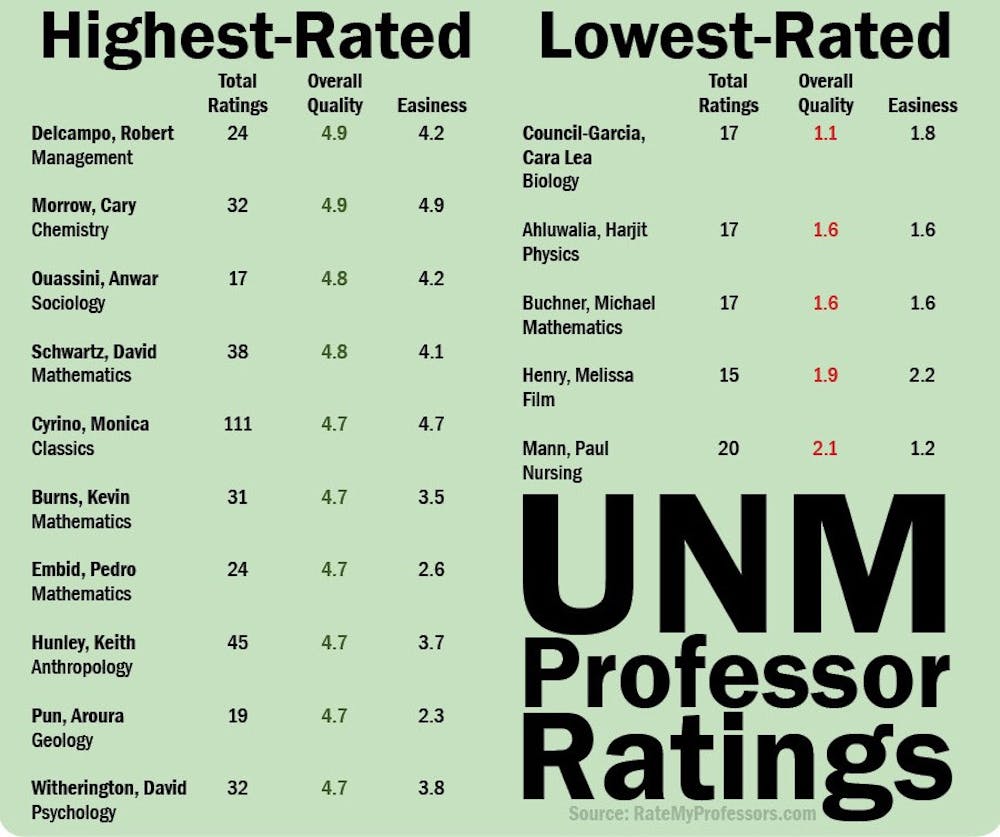Some UNM students say websites like ratemyprofessor.com (RMP) are useful for helping them choose which instructors to take classes with, but faculty argue that the system isn’t as useful as it seems.
Students on RMP rate professors on several dimensions: clarity, helpfulness, easiness and rater interest (interest level prior to attending the class) as well as physical attractiveness. Overall professor quality is determined by an equal weighting of only two criteria: clarity and helpfulness. The highest score is a five, while the lowest is a 0.
UNM’s average professor rating is 3.34.
Student Jeremiah Wynton said he visits the site before selecting classes every semester.
“It’s honest, and that is what I like about it,” he said. “UNM doesn’t give students any idea which professors are good, and it seems to be that is what is most important to students. I can find out in advance what a class is going to be like and make some sort of informed decision rather than getting stuck with the professor that is impossibly hard, or has no idea what he is talking about.”
Harjit Ahluwalia, a professor in the Department of Physics and Astronomy, is rated second lowest for teachers at UNM (1.6 overall), but said his poor ratings are a reflection upon the difficulty of the class.
“I agree most of them are not favorable to my teaching style,” he said. “Insisting on hard work does not make me popular. Students (need) to spend about 10 hours outside the class to acquire problem solving skills at an acceptable level and do well in class tests and exams.”
Student Ian Martinez said Ahluwalia demands too much from his students without offering help, on top of a thick accent that made it difficult to learn.
“It wasn’t that he was a bad teacher, he just expected you to know everything and it was just too hard to understand what he was saying,“ he said.
Ahluwalia said maintaining a rigorous curriculum is in the best interest of the future success of students, many of whom go on to medical school or pursue doctoral degrees. He said TAs offer help to students, but many refuse to study enough to do well.
“Almost universally, physics is considered a difficult subject and some courses are called ‘killer courses,’ but everyone expects to get an A.”
In contrast, Keith Hunley, associate professor of anthropology, said he was pleased to learn that students had rated him highly.
Get content from The Daily Lobo delivered to your inbox
“I am flattered and gratified to know that students rate me highly on RMP,” he said. “I am especially happy to read comments about how my classes make science accessible and interesting. This is a primary goal of my teaching.”
Hunley said online reviews provided by sites like RMP were helpful, while end of year evaluations results aren’t released to students.
“The target audience of online evaluations is other students, and the comments are public,” he said. “Professors are the target audience for in-class reviews, and they are largely private.”
Hunley said both styles of teaching evaluation fall short of giving a complete picture.
“I don’t care for the IDEA (end of year evaluation) forms at UNM — I think they are too generic to be of much value,” he said. “I always ask my students to fly through the multiple choice questions and spend the bulk of their time writing comments on the back of the form. I read every one of these comments, save the most valuable ones, both good and bad, and modify my courses accordingly.”
Gregory Heileman, associate provost for curriculum and director of the Office of Support for Effective Teaching said ratemyprofessor.com is a useful tool, but lacks the legitimacy and statistical significance of University evaluations.
“I think they have the potential to be useful, but if you look at the site, you get people who are very excited, or very angry. It isn’t representative of the total student population. It could be anyone getting on there, including the teacher giving themselves good recommendations.”
He said UNM does not currently have a system in place to help students learn about their instructors.
“We don’t have anything like that at this point. Our evaluations are for faculty improvement, and we have a lot of other programs to improve teaching.”
Robert Delcampo, assistant professor of organizational studies, scored a 4.9 overall. He said opinions on the legitimacy of RMP were likely biased.
“I think it’s a good tool for students and I’ve heard them say it’s really good, but my guess is the highest-rated people probably think it’s a great tool, and the worst-rated people think it’s terrible.”






